Can’t stop the urge to scratch your scalp? And the more you scratch the more you want to do it? Does this urge come when it’s most inappropriate? Itchiness on your head is a symptom that something is not well on your scalp. The reason for an itchy scalp can be very simple and common, but it is important to identify the problem so you can address it.
1| Allergic Reaction
Also know as allergic contact dermatitis it can happen quite often. This can appear as the result of a bad reaction to an ingredient in hair dye, shampoo or to a natural ingredient you might be using.
Hair Dye – If you dye or bleach your hair you should always do a patch test 24 to 48h before applying it all over your head. Don’t think that this only happens with a store bought dye! It can also happen with a professional. So never skip the skin test to avoid major health issues such as swelling of the scalp. Why not try henna? Here’s a recipe.
Shampoo – Studies have shown that SLS (Sodium Lauryl/Laureth Sulphate), a common ingredient in hair cleansers, can cause allergic reactions that can range from an itchy scalp to an inflamed one. You should confirm with your dermatologist if this is your case, but in the mean time try eliminating shampoos that contain SLS or simply co-wash (conditioner wash) your hair. You can also make your own natural shampoo with soap nuts.
Natural Ingredients – I know that when we use something natural we might not be thinking of any possible  side effects, but the reality is that it can happen. In fact, it happens all the time! Some people have allergies to nuts, seafood, milk, berries and the list goes on. I suppose you could say that the culprit is the use of chemicals/antibiotics, but for now, we’ll leave that for another discussion. If you, for instance, you like to use castor oil in your hair regimen please know that many people report having an itchy scalp when using it. The solution could be as simple as ceasing its use or diluting it with some other oil such extra virgin olive oil.
side effects, but the reality is that it can happen. In fact, it happens all the time! Some people have allergies to nuts, seafood, milk, berries and the list goes on. I suppose you could say that the culprit is the use of chemicals/antibiotics, but for now, we’ll leave that for another discussion. If you, for instance, you like to use castor oil in your hair regimen please know that many people report having an itchy scalp when using it. The solution could be as simple as ceasing its use or diluting it with some other oil such extra virgin olive oil.
Another cause could be the use of pure essential oils. These are very potent concentrations of plants/herbs and should not be used directly from its container. Some can be used topically, but in my opinion, if you are not a herbalist then they should always be diluted/mixed, they will not lose effectiveness. So, use just a few drops and it will be more than enough.
Laundry Detergents – Sometimes you may be allergic to the laundry detergents and perfumes used to wash your bed linen. When your head gets into contact with them, the heat from your head will speed the allergic reaction which can exacerbate eczema and psoriasis. Try using a laundry detergent such as ECOS Free&Clear that is scent-free and has a balanced pH to be non-irritant. Alternatively, you can always make a laundry detergent out of soap nuts, which is an organic and eco-friendly solution. Here’s a recipe for you.
2| Hygiene
Surprised to see this one here? Well, don’t be. It’s nothing to be ashamed of. It just so happens that some of us may sweat a little bit more from the scalp, or the use of oils/butter/cremes on our hair attract more dust and dirt from the environment or maybe you should reduce the time between your washing day.
Try to pay close attention to when you feel the urge to scratch your scalp. Is it after an intense workout when you sweat generously? Is it a few days after washing your hair when you had your hair down? Or perhaps too many days have gone between washing? To solve your itchiness you can rinse your hair with water, massaging your scalp to release dirt and sweat. You can also co-wash (conditioner wash) your hair between washing days or you can just move your washing days closer. Read 5 Ways To Refresh Your Scalp After Exercising.
3| Dandruff

This is a skin/scalp condition that can be triggered by a microbe, scalp oils, allergic reaction to oleic acid (Omega 9 fatty acid) or all three at the same time. It has many symptoms such as inflammation, redness, dryness or flakes but the most common one is itchiness. It can be very annoying and embarrassing when you get those “snowflakes” on your shoulders. To counter attack dandruff you can use a shampoo such as head&shoulders or a more aggressive and medicated one. Another option would be to use a natural solution such as an equal mix of beetroot juice and white or apple cider vinegar applied on the scalp overnight. Read the Benefits of Apple Cider Vinegar.
4| Skin Disorder
Sometimes the body’s immune system overreacts to a trigger and, as a result, doctors believe that a skin disorder such as eczema and psoriasis occurs. They can arise on the scalp and are associated with itchiness. You can follow your doctor’s course of treatment or you can use natural solutions available to minimise this such as aloe vera or tea tree oil.
5| Dry/Flaky Scalp
A dry and/or flaky scalp can be a normal happening. The reasons are varied it can be the use of an over efficient shampoo, cold and windy weather, dead skin cells, high air condition or even eczema. To curb this you need to protect your hair from the weather using a hat, scarf and/or protective hairstyle. Change your shampoo to a sulfate free one or co-wash, it won’t strip all the natural oils in the scalp. The use of vegetable oils like coconut or olive oil will help to moisturize the skin. Another thing you can do is a scalp exfoliation to remove dead skin cells, check the brown sugar hair scrub recipe.
6| Styling & Hairstyle
It can easily be overlooked, but the way you apply products on your hair can cause an “itchy problem”. It is important not to apply the product on the scalp as it can clog the hair follicles and you end up scratching your head. The way you style your hair is also important. Wearing your hair or weaves/extensions in very tight styles creates tension on your scalp which causes itchiness. If you change this practices you will see big improvements.
Now that you know some of the reasons for an itchy scalp, try to identify what is at the root of your problem, try some of the natural solutions suggested here and/or look for a professional opinion. If you’re not affected by this problem it is always good to know the causes to prevent them from arising.
Do you have an itchy scalp? What is the cause and what have you done to try to address it? Share your solutions here with us.

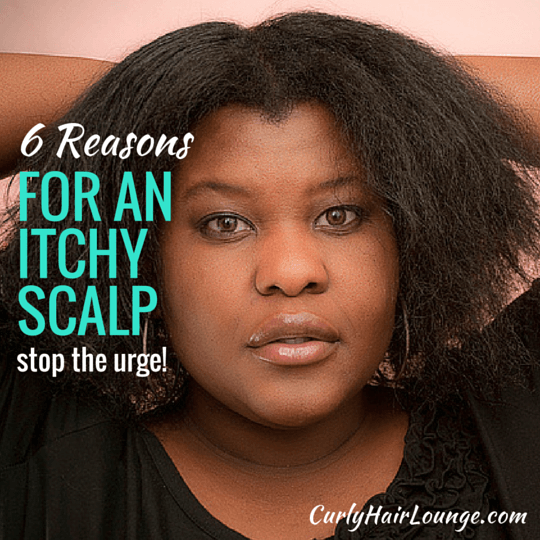

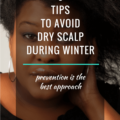
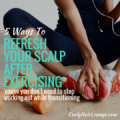
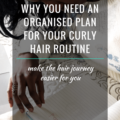
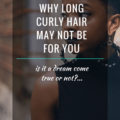
32 thoughts on “6 Reasons For An Itchy Scalp”
Very good info on your site. I heard about the sls being bad before but it seems like all shampoos I’ve seen has it. You need to explain earlier on in the article what co- wash is. It had me confused for a while until I saw lower down you had conditioner wash in brackets. When you do this, do you rub the conditioner into your scalp like you would with shampoo or do you just put it on the hair strands?
Hi Emma, thanks for your suggestion. Yes, you should rub the conditioner on your scalp for a couple of minutes to release all dirt. Then you apply the conditioner on the length of your hair and detangle. There are some brands that already sell this type of conditioner, Pantene is one of them.
As someone who has constant eczema and an itchy scalp, I was prepared to see a lot of misinformation. This is INCREDIBLY well-researched and informative, and my doctor and dermatologist has mentioned most of the same things to me. I only wish my mother had seen some of these while I was a young child. I could have been saved for years of embarrassing “snow” in my hair and on my shoulders.
The only thing I would add is that sometimes your scalp is more sensitive than your skin. There are many people who are allergic to certain kinds of detergent and dryer sheets. If all else fails, and you’re still itchy, try washing your bedding and other cloth that comes into contact with your hair with a sensitive detergent. Most detergents come with added fragrance, which is actually bad for your skin and irritates easily, and all laundry sheets have it. All Free & Clear has been working for me for years now, and I can really tell the difference when I sleep at someone else’s house. It’s cheaper than Tide and Downy, and you can also save on dryer sheets. I get it at Walmart or CVS. Tide Free & Gentle is more expensive than the All, but it does basically the same thing.
Hi Lauren! Thanks for your feedback and helpful information. Yes, when we sleep our head is in constant contact with the bed linen and many are allergic to the washing detergents used to clean them. The heat produced in our head in contact with the linen speeds the allergic reaction. I will add this to the post, it will surely help someone. Thanks for your contribution.
I’m glad it was helpful! Hopefully someone can ease their itch! 🙂
It was certainly helpful Lauren.
Hi Monica,
This is my number one problem for quite some time. After reading this list, I suspect that my itchy scalp is likely due to sweat. I work in an air-conditioning place most of the day and although I don’t sweat as much on the skin, I have very moist and warm scalp whenever I leave work.
Within hours I will be itching. I usually wash my hair in the morning and make it a point to blow dry it thoroughly. If it itch very badly, I will rinse it with water at night. Sometimes, I am tempted to shampoo it again at night, but fear that might not be too healthy. What would you recommend? It is advisable to wash my hair twice a day?
Thank you.
Hi Cathy, you’re definitely washing your hair to much. I would say that your scalp is dry from all the washing that is stripping all the natural oils from your scalp. The sweating makes it worst as the salt from the sweat irritates your dry scalp making it drier and therefore itchy. I would massage a bit of jojoba oil onto my scalp. Also, make sure the blow drier is not set too high, put it on a medium-low setting and check that your shampoo is “low-sulphate” as it’s less drying to your hair. Hope this helps.
Hi! Monica, I have a curly hair as well so your site is very helpful.
I’m glad to know I was helpful Lunasa, thanks.
Now I know when I sometimes feel itchy scalp! Thanks for giving solutions too.
Hope you find the root of your problem with the suggestions on this post. All the best Demi!
I’ve only recently started to have an itchy scalp. I’m going to try some of your tips and see how it goes. Thanks for the post!
Hi Hayley, do try a few tips and see if your itchiness subsides if not it is always best to go to a doctor.
Hi Monica,
I really relate to this post! I know I have a really strange reaction to fabric softener (which is good for my head as it doesn’t have to come in contact with it!) but if I wear stockings or something close to my skin that’s had fabric softener on it I break out in hives!
I know that after I work out I definitely get an itchy head but I’d never really noticed. Thanks for the handy hints, I’ll have to try them out.
Thank you for another informative post!
All the best
Katia 🙂
Hi Katia, I’m glad you really found this post helpful. Do try some of the tips and tell me how it went.
This is a good list.
Regarding, Sodium Lauryl/Laureth Sulphate, the laureth is much milder than the lauryl. I avoid Sodium Lauryl Sulphate because it cleans too well and is too stripping.
A lot of women are able to cleanse hair without any surfactants but even more can’t. For a lot of people, they need some kind of detergent to cleanse their scalp and hair of dirt, oil and product.
I once tried to go sulfate-free (3 months) and I was worse off for it. We’re all the best hairdresser for ourselves and it’s best to experiment until we get the best regimen. It can take time but it’s well worth it.
I like to use an alcohol-free toner (meant for the face) on my scalp after workouts. I don’t wash every day, usually once a week. The toner has been really helpful because we do sweat on our scalps. I also find rose water afterwards to be quite soothing. Rose water is wonderful, the real kind.
Hi Lane,
Sodium Lauryl/Laureth Sulphate are both considered very good cleaners and irritating to the skin, eyes and lungs. However, in your case it seems you have more of a reaction with SLS which has indeed been considered more irritating than SLES.
Nevertheless, according to EWG, Sodium Laureth Sulphate (SLES) seems to raise more concerns than Sodium Lauryl Sulphate (SLS) because it is frequently contaminated with toxic impurities (1,4-dioxane a manufacturing by-product) considered a carcinogen.
I personally use a sulphate free shampoo, I sweat a lot from my scalp when I exercise and I need to feel my scalp clean. I tried co-washing but it didn’t feel clean to me. Normally I do a mid-week co-wash (check my transitioning and exercise post) and I feel refreshed.
Rose water is very gentle and is a good choice to sooth the scalp. Maybe this post will also give a few other options in case you need them.
Hope to see you here more often Lana, thanks for commenting!
I just found this past. I’ve been desperately searching for solutions for years to my itchy, flaky scalp. Every time I think I’ve found something that works, the problem returns. I’ve used Head and Shoulders, Nizoral, salon shampoos and conditioners, coconut oil, Demarest for psoriasis (which my doctor says I do not have but I’m desperate!) A friend recommended tea tree oil products. I started using a tea tree oil and mint shampoo and conditioner. My sister-in-law said she only uses conditioner and no shampoo. So I switched to just conditioner the last time I washed my hair.
I’m wondering, how long do you “test out” a product before you decide it is or is not working? Also have you heard of or tried tea tree oil as a treatment?
As I mentioned I’ve tried everything I can think of to end this problem including seeing my doctor. Nothing seems to work. It is not only uncomfortable and sometimes painful (from itching) but it also lowers my self esteem. I work in an office and try to look my best but I never feel confident with flakes on my shoulders.
Thanks for your help!
Hi Amy,
It sounds to me like you may be allergic to some ingredient in your products. Have you tried switching to all natural ingredients in your hair routine? If your shampoo has sulphates they are known to cause contact dermatitis like Sodium Lauryl Sulphate or Ammonium Lauryl Sulphate. It could also be that your hair and scalp have too much product build up that needs to be removed. One other thing you should also consider is if your hair and scalp’s pH is balanced (do an apple cider vinegar for this). Either way, if I were you I would try switching to natural products and avoid sulphates and silicones.
As for tea tree,it is very good and I use it on my DIY. It is known to fight bacterial and fungal infections, it is antiseptic and helps with itching and flaking. However, its benefits will depend on the other ingredients in your shampoo and conditioner. If they have an ingredient(s) you have an allergic reaction to, you will still be facing the same issues (perhaps at a lesser degree).
Co-washing is a good way to refresh your hair and keep its moisture. However, I wouldn’t do it has my only method to cleanse my hair. You can read this article and this one where I explain more about it.
As for how long you should stick with a product or hair care practice, I would say to give it a month unless the effects on your hair and scalp are so bad that it is better to stop. Please remember, to clarify your hair before you start any new practice.
I hope this helps Amy!
xoxo
Monica
Hi Monica! Sometime these hair dyes and shampoo might come little problematic for me. I read through out your blog and find the paragraph of Natural Ingredients. In your opinion do you think they are completely organic to implement on our scalped? Or PLEASE do suggest me a good moisturizer hair lotion for my scalps. Thanks!
Hello Umair. Whether or not your natural ingredients are organic – made/produced without the use of (harmful) chemicals ingredients – that is something you should make sure of when buying them. However, it can definitely trigger some allergic/scalp reaction. Before any suggestion could be made for the use of a good moisturiser, your hair routine and product use would need to be examined, the problem could lie in here. Ultimately, if you’ve tried different solutions in the past and none has worked your scalp issue you should consult with a dermatologist/trichologist.
Hi Monica, your information is just right, check link below to know more about it and some remedies and recommendations for itchy scalp… hope it helps
https://www.skinexamine.com/itchy-scalp/
Thanks for sharing Fatimah.
Thanks for this information but my question is how to resolve dandruff issu for quickly.
Hi Danish, if you have a scalp condition that does not improve you need to consult with a dermatologist or a trichologist.
Hey Monica! Great information provided. Itchy scalp can also occur due to scalp yeast infection.
Thank you.
Hi, Monica, I have a problem of itching in styling so which oil I can use?
As you’ve just read itchiness can be due to many reasons, as you’ve just read. Oils can cause more itchiness as they attract dust to hair and scalp. Make sure you are washing your hair frequently, you don’t have any ingredient allergies and also consider as culprits product buildup or hard water minerals that can dry the scalp and hair causing itchiness.
Hey Monica, I am having a dandruff issue. I have tried many shampoos to get rid of this, Please suggest me some remedies.
If you’re having a dandruff issue that won’t go away, you should talk to a trichologist or a dermatologist to get it sorted. However, you should make sure that you don’t have product buildup, that you are not making product/ingredient concoctions/applications that cause flakes, that you don’t have hard water or even that you are washing your hair frequently with the appropriate shampoo to your current hair routine.